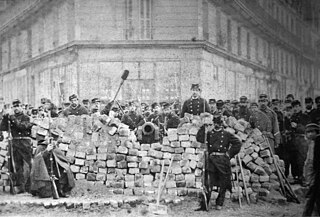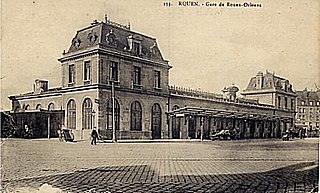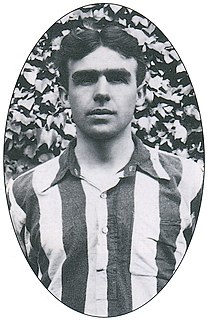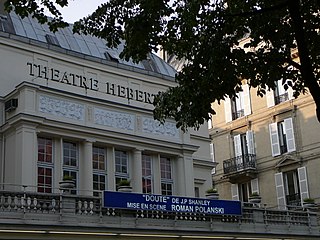Eugène Pieton (31 December 1837, Le Neubourg – 18 November 1904, Elbeuf) was a weaver and a Labour Court advisor in Elbeuf who was active in the workers' movement. [1] :403

Le Neubourg is a commune in the Eure department in Normandy in northern France. The composer and organist Roger Boucher (1885–1918) was born in Le Neubourg.

Elbeuf is a commune in the Seine-Maritime department in the Normandy region in northern France.

Weaving is a method of textile production in which two distinct sets of yarns or threads are interlaced at right angles to form a fabric or cloth. Other methods are knitting, crocheting, felting, and braiding or plaiting. The longitudinal threads are called the warp and the lateral threads are the weft or filling. The method in which these threads are inter-woven affects the characteristics of the cloth. Cloth is usually woven on a loom, a device that holds the warp threads in place while filling threads are woven through them. A fabric band which meets this definition of cloth can also be made using other methods, including tablet weaving, back strap loom, or other techniques without looms.
In 1869 he joined and soon became a leading figure in the Federation of Rouen Workers (French : Fédération ouvriere rouenaise), the local branch of the International Workingmen's Association. [2] In 1869 he was a delegate to the Basle Congress of the IWA. [3]
The Federation of Rouen Workers was set up in 1866 as a local branch of the International Workingmen's Association. Émile Aubry, a local printer, was the corresponding secretary.

French is a Romance language of the Indo-European family. It descended from the Vulgar Latin of the Roman Empire, as did all Romance languages. French evolved from Gallo-Romance, the spoken Latin in Gaul, and more specifically in Northern Gaul. Its closest relatives are the other langues d'oïl—languages historically spoken in northern France and in southern Belgium, which French (Francien) has largely supplanted. French was also influenced by native Celtic languages of Northern Roman Gaul like Gallia Belgica and by the (Germanic) Frankish language of the post-Roman Frankish invaders. Today, owing to France's past overseas expansion, there are numerous French-based creole languages, most notably Haitian Creole. A French-speaking person or nation may be referred to as Francophone in both English and French.

The International Workingmen's Association (IWA), often called the First International (1864–1876), was an international organization which aimed at uniting a variety of different left-wing socialist, communist and anarchist groups and trade unions that were based on the working class and class struggle. It was founded in 1864 in a workmen's meeting held in St. Martin's Hall, London. Its first congress was held in 1866 in Geneva.
Following the defeat of the Paris Commune several of the leading figures in the worker movement around Rouen went into exile. However Pieton organised a meeting of weavers in Elbeuf which led to the formation of a corporation of weavers. [1] :347

The Paris Commune was a radical socialist and revolutionary government that ruled Paris from 18 March to 28 May 1871. The Franco-Prussian War had led to the capture of Emperor Napoleon III in September 1870, the collapse of the Second French Empire, and the beginning of the Third Republic. Because Paris was under siege for four months, the Third Republic moved its capital to Tours. A hotbed of working-class radicalism, Paris was primarily defended during this time by the often politicised and radical troops of the National Guard rather than regular Army troops. Paris surrendered to the Prussians on 28 January 1871, and in February Adolphe Thiers, the new chief executive of the French national government, signed an armistice with Prussia that disarmed the Army but not the National Guard.

Rouen is a city on the River Seine in the north of France. It is the capital of the region of Normandy. Formerly one of the largest and most prosperous cities of medieval Europe, Rouen was the seat of the Exchequer of Normandy during the Middle Ages. It was one of the capitals of the Anglo-Norman dynasties, which ruled both England and large parts of modern France from the 11th to the 15th centuries.













